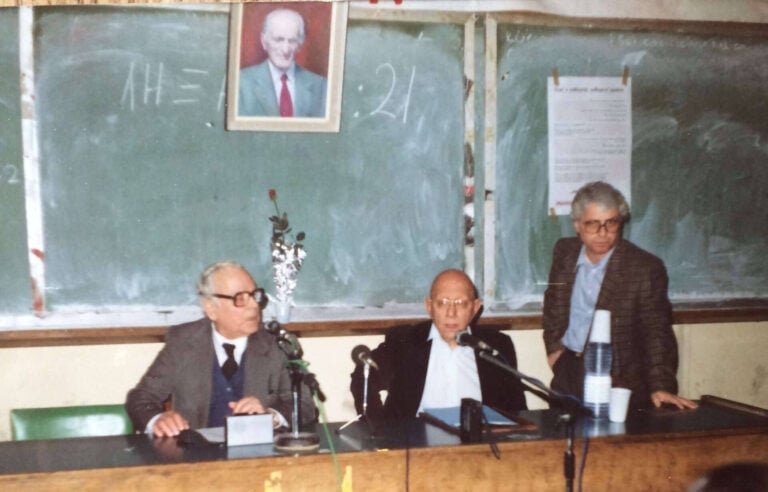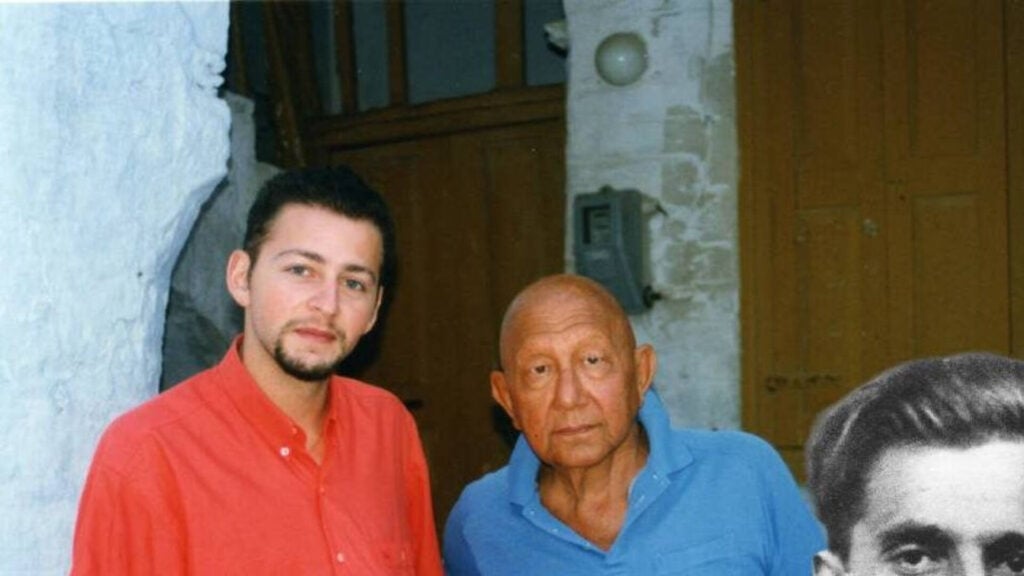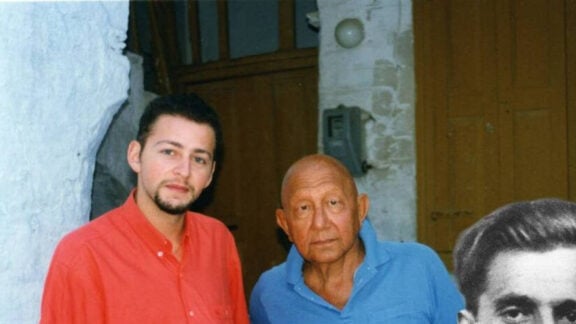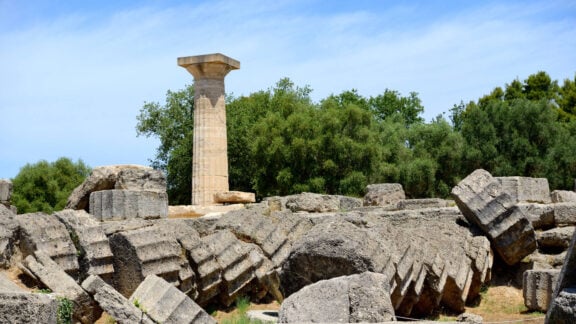How did an admirer of Agis Stinas (a member of the Greek Communist Party during the interwar period and later one of the leading figures of Greek Trotskyism, 1900–1987) come to meet, entirely by chance, an admirer of Cornelius Castoriadis (1922–1997)?
I came to know Cornelius, indirectly unfortunately, not directly or personally, through ‘the greatest social revolutionary of all countries’, Agis Stinas, or, by his given name, Spyros Priftis. He was the greatest Greek revolutionary! As for Cornelius, I met him only once, and we simply exchanged greetings. I told him that I knew Stinas well. He was walking into the publishing house “Ypsilon / Books,” on Zoodochou Pigis Street. I recently passed by 5 Ypatias Street too, Castoriadis’s old home.
Stinas lived at 21A Aristarchou Street, in Pangrati, on the ground floor, in a flat he was given rent-free by the General Secretary of the “K.O. Machitis” group, Aghisilaos Christodoulopoulos, whom we sadly lost too soon. Stinas, as I remember him, was an absolute renouncer of material things. He was dirt poor, and it didn’t bother him in the slightest. I never once saw him with money on him, never saw him order anything. Not even a soft drink. He never talked about money, or about financial difficulties—he lived for, and only from, his ideas. For people like him, who had spent many years in prison, he would say with a smile: “I went in a boy, came out an old man…” A phrase I often use myself now, I first heard it from him. He wore an old-style corduroy jacket and trousers. He didn’t smoke.
I used to visit him very often, whenever I felt like it. I would simply [go to his place], ring the bell, and he would let me in. He was deeply serious, a lifelong defender of his ideas, and a leader. I’d step into his home and we would talk about the movement and history. He wasn’t involved with anything else, only with ideas, books, and newspapers. Once, I found Yiannis Tamtakos there [1908–2008, who had worked in Australia from 1951 to 1966], inside the house. Another time, I heard him say how moved he was that Pablo (Michalis Raptis) had written in his autobiography about his ascetic way of life.
Stinas was always very kind to everyone, and especially to women. He never mocked anyone, never spoke with hatred about anyone, not even about the Stalinists who, during the Occupation, were hunting both him and Castoriadis down to kill them. We had agreed, since he couldn’t stand for long (the dampness from Acronauplia had affected him), that I would take him by car to Exarchia, to have a coffee and to talk with anyone who might want to speak with him. I remember, he was moved. But we didn’t make it in time…
When Stinas told me that Cornelius Castoriadis had been part of his organisation during the Occupation, I felt great joy—not only because he was a great thinker, but because he was also a revolutionary. Because Cornelius wasn’t just an intellectual, he was a revolutionary intellectual. He wasn’t only a thinker, he was a revolutionary thinker…
His thought was revolutionary. In favour of workers’ autonomy, of the system that “would succeed capitalism” but would avoid Stalinist bureaucracy and would either realise a society of workers’ councils—or else, it wasn’t a revolutionary society at all. During the French May of ΄68, Cornelius was, for some Greek students and seekers, the very embodiment of that French May. And “the French May was Cornelius,” as the filmmaker Kostas Ferris once said.

I once asked Stinas about Castoriadis, “Is he a revolutionary? Is he a far-left council communist? Because that’s where he belongs. If he belongs anywhere, that is.” And he told me, “He’s still a member of the Group today! The Group is still active.” He never said, “my Group.” On the other hand, as far as I know, Cornelius never fully identified with any organisation. Stinas supported the anarchists, while always holding onto his own views.
I met the writer and narrator of Cornelius’s life in the video/lecture quite by chance. Chance? Maybe not! In his “Memories,” Stinas writes that “great ideas wait for the right minds to conquer and inspire them.” His speech is precise and amazing, and after meeting Cornelius, he tasted the greatness –both personal and ideological– of the Stinas Group. He mentions Castoriadis’s love for cigars, whiskey, women, and ideas.
So, I met Dimitris Eleas in a political café. Not in Exarchia, or around the University [of Athens], but in Kolonaki. Not in an expensive café, though—rather in a simple, proletarian spot (Le Pain de Vie), at least as far as the prices go. He was a likable Greek guy living in the U.S… But as we talked, I just couldn’t believe it was by chance –no in a protest, no in a public speech– that I met a selfless person and revolutionary. Greek kids abroad are rarely leftists, and even more rarely revolutionaries. Their economic survival often makes most of them Right-wing, or centrist, or at best, Democrats.
In Dimitris, I found an almost perfectly kindred spirit. He, a devoted admirer of Cornelius, the student and later teacher of Stinas. And me, always an admirer of Stinas. I have met many ideologues, but such a closeness of thought I have never encountered before. His view –that “Castoriadis is the greatest Greek after Aristotle”– is remarkable. It shows sharp political insight, something many fail to grasp.
Dimitris Eleas thinks about Cornelius every day. I think about Stinas. I’m “Stinian to the bone,” he’s “Castoriadian to the bone.” But unfortunately, he doesn’t live in Athens, so we can’t meet every day. And have the kind of conversations that would bring back to life the 1960s, when some people tried to storm both the Winter Palace and the Heavens…
*Christos Morogiannis lives in Athens. He was a friend of Stinas from 1982 until his passing. This is a translation of a Greek text that originally appeared in SLpress of Athens.









